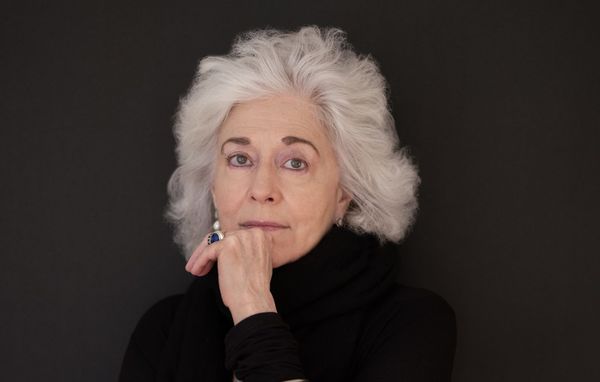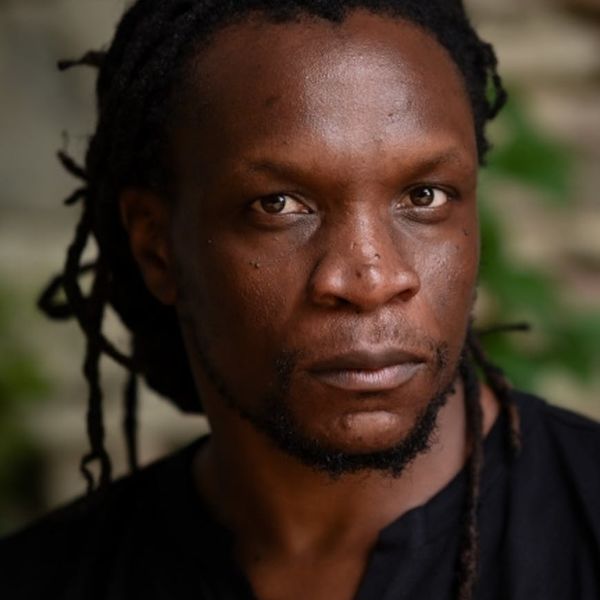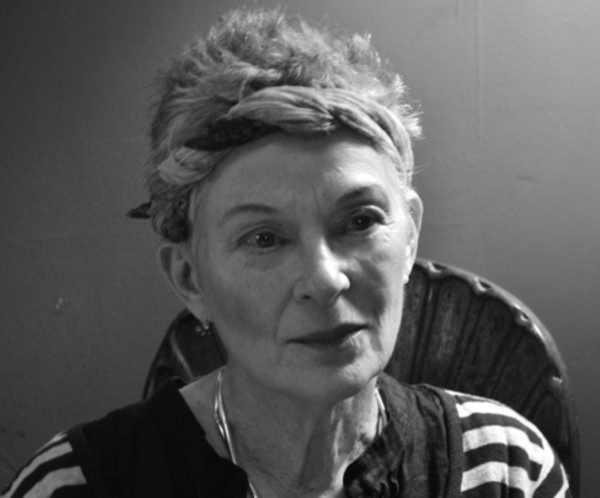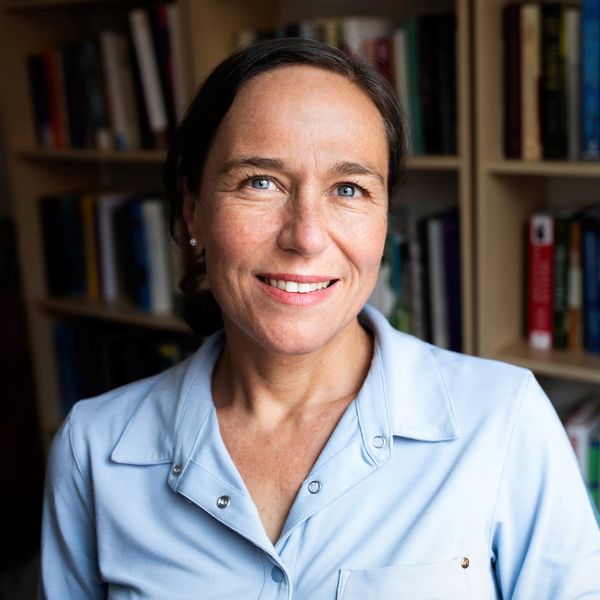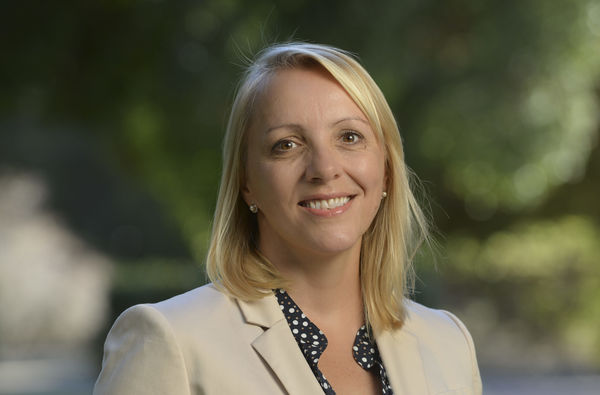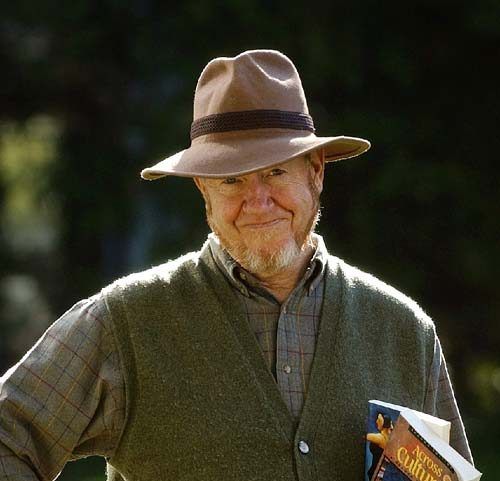The 2024 Griffin Poetry Prize Finalists Discuss Their Work
In just a few days, the Griffin Poetry Prize will hand out the largest monetary poetry award in the world to one special book and it's author(s). Each year, we cover the prize by featuring a roundtable interview with the finalists, and we're thrilled to share that with you here!
The winner will be announced at the Griffin Poetry Prize Readings to be held at Koerner Hall in Toronto on Wednesday, June 5, and will be awarded $130,000. The other shortlisted finalists will each receive $10,000.
Tickets for the 2024 Griffin Poetry Prize Readings are now on sale and can be purchased at the box office of Koerner Hall, 273 Bloor Street West or online.
Open Book:
Tell us about your nominated collection and how the project originated for you.
Jorie Graham:
I lived through a prefiguring summer of extraordinary heat—people died in the cities—some of my trees died—& I began researching climate change. I put this note in the book (NEVER) I wrote at the time ( 2001):
“A fact struck me as I was writing these poems, During the 1850’s, while Darwin was concluding “ On Tue Origin of Species”, the rate of extinction [ for species] is believed to have been one every five years. Today, the rate of extinction is estimated at one every nine minutes. Throughout the writing of this book, I was haunted by the sensation of that nine minute span—which might amount to the time it takes to read any poem here before you. My sense of that time frame [and its inevitable increase, even as we “speak”] inhabits, as well as structures, the book. It is written up against the sensation of what is now call “ecocide”. I was also influenced by, among other texts, the “World Scientists’Warning to Humanity”, sponsored by the Union of Concerned Scientists (1993).”
And it’s been almost a quarter of a century since then…
But that acceleration is reflected in the very names of the books that followed —“Sea Change”, “Fast”, “Runaway”…and finally “To 2040”
OB:
Are there images, themes, or questions you notice recurring in your work? If so, what are they?
JG:
Your CanLit News
Subscribe to Open Book’s newsletter to get local book events, literary content, writing tips, and more in your inbox
Birds, wind, dust, drought, overmuch sun, overmuch water—the disappearance of species then the complete disappearance we call “extinction “—and the emotions that such a deranged, disequilibrated relationship with what I call “creation” (but others might call the planet) gives rise to. Such as an altered relationship to time, space, the future & the past. Also an attempted reopening of our ancestral relationships with deep time—deep past & deep futurity—a reawakening of that branch of the imagination. Because the imagination can go there. Especially in poetry which marries the imagination to the senses, and thus to emotions. The imagination is in danger of becoming dormant. We urgently need to reawaken it. It might hurt, as with blood flowing into numb limbs….This includes of course poetry‘s additional task of keeping us open to beauty, joy, wonder & the ability to praise . Of course interlinked with ecocide we need to resist our endless forays into dehumanization at the hands of certain aspects of technology.
OB:
Tell us what a typical writing day (if such a thing exists for you) looks like while you're working on a collection.
Poems come out of nowhere. Then they require endless revision. But in between the poems, there are long, long droughts. I just have had to learn to keep, in them, awake and productive. Now that my time is running out, because I am ill, those fallow periods that always felt so rich to me can feel very anxiety inducing. But I still have to love them and extend into their negative capability – they are where the lessons are, and where growth and change and initiation occur. All manner of initiation….
OB:
This is the second year since the Griffin Poetry Prizes merged into a single prize open to writers from any country. If you could recommend one poem or collection that you feel is a great representation of your country’s poetry culture, what would it be?
I write in English which is a vast language, worldwide. There is an explosion of genius at present in the various languages we still call “English”, and in the vast Anglophone sphere. That language is my “country”. And I guess I would have to say one of the greatest achievements outside of Shakespeare in that country I call English is still John Keats’ “ To Autumn”. But if you need me to remain strictly national, I guess it would be Whitman’s “ Song of Myself”—which of course contains multitudes. Perhaps especially because we are still in the endless war, and he is still at our bedside transcribing our letters home.
Open Book:
Tell us about your nominated collection and how the project originated for you.
Ishion Hutchinson:
The collection is a book-length lyric of two intertwining narratives, that of the experience of West Indian volunteer soldiers during World War 1 and a boy called Godspeed living in rural eastern Jamaica of the 1990s. It originated in 2018 the centenary of the end of the war when I was commissioned to visit the Imperial War Museum in London to write a single poem which drew on primary sources in the museum. Moved and haunted by what I found in the museum, the poem grew from small chamber music size to large symphony orchestra size without losing, I hope, the intimacy of the former. That took about seven years to shape.
OB:
Are there images, themes, or questions you notice recurring in your work? If so, what are they?
IH:
Many things recur in my work so it is difficult to isolate one thing over another. I think, in sum, as a Caribbean poet who is still working through the metaphysical prison of colonialism, I am always trying by different means of language to amplify Caliban’s famous retort to Prospero in The Tempest: “You taught me language, and my profit on’t / Is I know how to curse. The red plague rid you / For learning me your language.”
OB:
Tell us what a typical writing day (if such a thing exists for you) looks like while you're working on a collection.
IH:
Depending on the day, it can be an unseemly sight! While working on a collection, meaning I have reached the point where I can’t take the poems further, my study turns into a mad artist’s workshop. Papers are pasted on the floor and on the walls. I pace around with a marker and a pair of scissors—sometimes with a long blade paper cutter—slicing and marking and rearranging as I read fragments out loud. Some days are less chaotic; those days I am lying prone on my future ruins.
OB:
This is the second year since the Griffin Poetry Prizes merged into a single prize open to writers from any country. If you could recommend one poem or collection n that you feel is a great representation of your country’s poetry culture, what would it be?
IH:
The collection I would recommend is Black Sand: New and Selected Poems by the late, great Edward Baugh. Baugh is to Jamaica and the Caribbean what Cavafy—to take one example—is to Greece, a poet of intense, ironic intimacy, whose modest, supple language sees his people and landscape in a fresh light. He was and remains a marvel.
Open Book:
Tell us about your nominated collection and how the project originated for you.
Ann Lauterbach:
My books are not really conceived as projects. At a certain moment there are sufficient individual poems to begin to think about gathering them into a collection. Many of the poems in Door were written during and just after the Covid pandemic, so there is a strong sense of an awareness of an interior, both in the sense of a room, or rooms, and books, as well as mental life—dreams, memories, thoughts. And so a pervasive if only tacit question about solitude, how it might inform connectivity, or perhaps allow for an extension from self to world through acts of receptivity. That’s probably a bit abstruse. I am trying to describe the mood of the poems. Some of them seem to inscribe a trajectory, a from-to motion, which possibly arose from the place of shared isolation. Working on the collection was exhilarating, as I slowly became aware of its central concerns. This is one the pleasures of writing without an agenda: discovering connections between and among disparate poems.
OB:
Are there images, themes, or questions you notice recurring in your work? If so, what are they?
AL:
I have come to realize that all of my work, and Door is no exception, is a kind of argument with time. Argument -- meaning a resistance to rote notions of addition, computing, counting. I want
to invest time with something that isn’t simply passage, but is dynamic, so that narrative is understood has being more than simple quotients of cause and effect. Space is for most of us visual; and time is –what?—numerical? This dualism is ancient but, like so many of our accepted dichotomies, it is not cogent, not in keeping with experience or what we know to be the case. So I want my poems to subvert or thwart a formulaic idea of narrative, to create a dynamic in which an event is not in a fixed location in time-space, in order to perhaps open the paths to meaning. To put it more simply: a desire for the poem itself have the status of an event, as in: something happened, what was it? These thoughts are not prevalent when I am writing but are maybe beside or behind the poems, like shadow figures.
In Door, the trope of a door is, obviously, recurring: seven individual poems so titled, plus an eighth, The Blue Door. So the poems in this collection are engaged with thresholds, transitions, movement, links --- spatial and temporal, syntactic and fragmented. These in turn raise questions about the open and the closed, themes which have been part of my work for some time: the open hand, the field. Also currents between subjective interiority and the perceived or observed world. Nature is frequently evoked, not so much as distilled image (looking at) but as a constant reservoir of absorbed imagination and engaged attention; that is, nature as what we are part of, not apart from. There is also perhaps a more acute desire to engage notions of plurality and reciprocity, as the world becomes increasingly divisive and torn. Some of the poems in Door are asking questions about belief, not only whether, or how, spiritual needs can be met in a dominant secular and materialist culture but, more broadly, about our fraying belief or trust in the democratic experiment. So there seems to be a more acute questioning than in earlier work of the status of words -- or even language itself --- as an effective way to bring persons together, our common needs and desires. I have always thought of poetry as a kind of linguistic guardian, and so there is a fear that words are perhaps failing, that we have stopped caring sufficiently for them and, by extension, for each other and for the world. Along with these inquiries and doubts is a formal interest in a poetics that embraces complexity, or variousness, while at the same time wanting to be clear --- without being reductive, or what I think of as “literal”.
OB:
Tell us what a typical writing day (if such a thing exists for you) looks like while you're working on a collection.
AL:
I recently heard the poet Terrance Hayes speak; he clearly has developed a daily writing practice and I felt admiration and envy, as I have never had a routine. At base, my life is a constant agon between disorder and order; extremes, alas, that do not convert easily into temporal schedules.
There are long periods when I don’t make a poem, although writing of one sort or another is constant. I need wandering time, a kind of vagrancy, before a poem begins to form. I often note down scraps of speech or copy a line or a phrase from something read. There is now a file called “quotes for the future” containing pieces of language excerpted from various sources, which may turn out to be the seeds of another collection. Once there is a collection, the process is intense, as I shift and revise right up to the deadline.
OB:
This is the second year since the Griffin Poetry Prizes merged into a single prize open to writers from any country. If you could recommend one poem or collection n that you feel is a great representation of your country’s poetry culture, what would it be?
AL:
That is really difficult, because America, obviously, is not a single culture and its poetry happily reflects that fact more these days than perhaps at any previous time. No single poem or collection could possibly represent this diversity. That said, I might want to suggest George Oppen’s Of Being Numerous, which won the 1968 Pulitzer Prize, as a good place to start.
Open Book:
Tell us about your nominated collection and how the project originated for you.
Amelia Glaser:
This book came together not long after the full-scale invasion. Yuliya and I were already translating Halyna’s poetry, and several fortuitous events helped to make the book happen.
Yuliya and I began translating poetry by several contemporary Ukrainian writers around 2019. At the time, our modest goal was to put together a volume of contemporary poems that would showcase the phenomenal writing coming out of Ukraine, and some of our favorite pieces were by Halyna Kruk. Yuliya had met Halyna (who is also an academic) at an academic conference, but learned of her poetry only later. During the pandemic, translating together over zoom became a life-saver for us. Yuliya was in Kyiv when the lock-down happened in 2020, and I was juggling teaching and small children back in California. We would sit together for an hour or so after I had put the kids to bed, which was morning in Kyiv, and we would just talk through poems. It was a calm, creative space in an otherwise frenetic and anxious time. In addition to working closely on poetry together, I will add that Yuliya and I became close friends in this process, which was really rare and wonderful in the beginning of Covid.
By the time the full scale invasion took place in February 2022, we had already begun to think of our project as somewhat larger than a single anthology. We had translated several of Halyna’s poems together, and were very happy with how some of them worked in English. That year, I was on sabbatical at the Harvard Radcliffe Institute, and had the benefit of some wonderful friends and colleagues there who were very supportive of my translation work. On February 24th, 2022, when the invasion took place, one of these colleagues, Ralph Eubanks, wrote to me asking whether I was going to share some of the poems Yuliya and I had been translating. He put me in touch with an editor at Literary Hub, and LitHub immediately offered to publish a series of translations by contemporary Ukrainian poets. We realized that it was urgent to get the words of Ukrainian writers out into the world quickly, and Halyna was among the first poets we promoted in LitHub.
Shortly after publishing her work, I was able to bring Halyna to Harvard to give a reading together with another Ukrainian poet, Iya Kiva. Askold Melnyczuk, the editor of Arrowsmith, helped to co-sponsor Halyna and Iya’s visit, and soon after the reading, we began to talk about putting together a collection. (Yuliya and I are also continuing to co-translate Iya Kiva’s work, and this volume is forthcoming with the Harvard Ukrainian Research Institute.)
OB:
Are there images, themes, or questions you notice recurring in your work? If so, what are they?
AG:
We were very interested in highlighting Halyna’s wartime poems. About half the book was written after the full-scale invasion. But we also attempted to show some of Halyna’s progression as a poet, so we included several things from before 2022, and even a couple of poems from before 2014.
I think that Yuliya and I both really connected with Halyna’s poetry of the war, because she approaches it from a variety of highly intellectual angles. Sometimes a poem will bring in references to Greek mythology, other times to Ukrainian modernist poetry, other times to physics or geology. As scholars of literature who care deeply about language, Yuliya and I were able to approach Halyna’s poems as intellectual challenges, and we loved working together to try and approximate her wonderfully musical Ukrainian with our English.
One thing that we strove for as translators was to capture a sense of Halyna’s alliteration. While we could not capture the same sounds that exist in the Ukrainian, we viewed many of her poems almost musically, and tried to find a way to mimic the rhythm and repetitions of vowel and consonant sounds in our English. We also tried to pay close attention to Halyna’s use of voice. She has a wonderful way of animating objects – a ficus, a piece of anthracite; she also gives voice to characters – a child, a teacher. When sitting down together to come up with a final version of each of the poems, Yuliya and I would try and think about how the voice and characters emerged in the original.
OB:
Tell us what a typical writing day (if such a thing exists for you) looks like while you're working on a collection.
AG:
I have a full time job as a college professor, so when I am teaching, my week tends to be divided into teaching and non-teaching days. On teaching days, I have to think primarily about preparing my lectures and material, and reading my students’ work. I try to reserve at least a couple of non-teaching days each week for writing. For me, translation integrates into my own writing practice in a mutualistic way. In addition to my work as a translator, I am a literary critic, and occasionally write my own poetry and more creative prose.
On writing days, I try to wake up and spend at least an hour writing in the morning. This can be creative or critical writing – whatever feels the most urgent to me. In the afternoon, once I’ve written down all the new ideas I have, I give myself the “treat” of turning to translation. Over the past couple of years I find myself often spending 2-3 hours on translation in the afternoon and evening. This work is often painstaking, but it also feeds me as a writer and reader. There is nothing else in the world that allows you to climb into someone’s words, rhythm, and imagery like translation.
OB:
This is the second year since the Griffin Poetry Prizes merged into a single prize open to writers from any country. If you could recommend one poem or collection n that you feel is a great representation of your country’s poetry culture, what would it be?
AG:
I am so pleased that they have opened the prize up to translations! There are many poets in Ukraine now, whose work is truly phenomenal. In addition to Iya Kiva, with whom Yuliya and I have worked closely, I love the work of the young poets Artur Dron, Yaryna Chornohuz, and Kateryna Kalytko. Other phenomenal Ukrainian poets are Ostap Slyvynsky, Luba Yakymchuk, and Iryna Shuvalova.
Open Book:
Tell us about your nominated collection and how the project originated for you.
Yuliya Ilchuk:
The collected volume of Halyna Kruk’s poetry was created during the first months of Russia’s full-scale invasion of Ukraine. Amelia Glaser and I have translated Halyna’s poetry since 2019, but only in 2022 we decided to publish a collected volume. When we approached Halyna with the offer to translate her most recent poetry, she has prepared about 80 poems for us, all written during the past 10 years of the war. The selection was titled “Букwar” which combined the first letters of the Ukrainian word for the “Primer” (“bukvar”) and the English word “war”, signifying the process of relearning the language under new existential threat for Ukrainians. These poems, although published under the new title “A Crash Course in Molotov Cocktails,” laid the foundation for our volume.
OB:
Are there images, themes, or questions you notice recurring in your work? If so, what are they?
YI:
I was struck with the overwhelming recurrence of the objects from the peace time that during the war acquired new meaning and function: the infrared hunting spotlight is now used in the war to detect and shoot humans; the emergency backpack is redundant when one is searching for the bomb shelter amidst the night; the survived ficus has become a silent eyewitness of the disastrous shelling and shoot the roots through the building holding it up together; hard-liquor bottles are being collected and used by families to make Molotov cocktails, etc.
OB:
Tell us what a typical writing day (if such a thing exists for you) looks like while you're working on a collection.
YI:
As a full-time professor at Stanford, I have only summer and winter breaks to work on my translation projects. Usually, Amelia and I separately translate poems in an excel file and then meet on zoom to discuss the variants and finalize the edits. Then, we share our translations to the author in google doc and meet with her on zoom to refine our translations.
OB:
This is the second year since the Griffin Poetry Prizes merged into a single prize open to writers from any country. If you could recommend one poem or collection n that you feel is a great representation of your country’s poetry culture, what would it be?
YI:
I would recommend the collection of poetry by the greatest Ukrainian poet Vasyl Stus who spent 13 years in the Gulag for his political views and wrote about 500 poems from the prison. His best work of poetry is “Palimpsests” (written 1973-1980, published posthumously in 1986). In his letter to another Ukrainian dissent Mykola Plakhotnyuk, Stus wrote: “...our only optimism is in standing upright. And this posture makes us all brothers..." I think Vasyl Stus’s poetry best represents the creative spirit of my people.
Open Book:
Tell us about your nominated collection and how the project originated for you.
George McWhirter:
Since I am the translator of Self-Portrait in the Zone of Silence, which New Directions published, I will tell you how the translation project originated for me.
I was on holiday at Sproat Lake on Vancouver Island three summers ago when I got an urgent email from Homero and Betty (Aridjis) telling me that New Directions and Declan Spring had agreed to do a book of Homero’s recent poetry. The email was followed by a list of poems that were to go into the anthology. They were from several of the most recent books, which I already had, and many of the poems I had already translated for Homero to use as the English versions for readings and talks in various institutions and countries. One of the books selected from, Solar Poems, I had already translated in full for Homero’s bilingual publication with City Lights, San Francisco.
OB:
Are there images, themes, or questions you notice recurring in your work? If so, what are they?
GM:
Again I have to speak to Homero’s book in answering this question.
For Homero, accidentally shooting himself as a young boy in Contepec, Michoacan, Mexico, brought on an almighty awareness of life and death. The accident turned into the epiphany at the core for his poetry because it left him wide-eyed with dread and wonder at everything around him, everything magnified by fear — if Blake says, ‘fear is the beginning of wisdom’, for Homero Aridjis, it was a shotgun blast. He returns to that moment in his poems, and in Self-Portrait in the Zone of Silence, to his hospitalization (“Self-Portrait with Hands”), and to his near-death from the gunshot with a visit to his would-be sponsor for the other world (“Godmother Death”). Through his poetry, Homero visits frequently with his long-dead parents, a Greek father and Mexican mother, (“Meeting with My Father in the Orchard”, “Meeting with My Mother in the Old Kitchen”), and of course, Contepec (“I Always Dream of a Place that is Some Other Place”). Again and again, Homero returns to the cruelty of the Mexican gods (“We Are Children of Cruel Gods”), to the corruption of its politicians and Narcos (“With Corruption”, “The Saint of the Narcos”), to the plight of the poor and downtrodden (“Epitaph for Lupe Velez”, table dancer), to the desperate lives of the illegal immigrants in the U.S. (“I Am an Undocumented in Eternity”), to the quiet desperation of those they leave behind (“The Country Woman”) and in their parallel existence: dogs (“Street Dog”, “Dog Abandoned on an Island) and in one poem (“Like a Dog”— a love poem to his wife, Betty) he is as a dog, supine at her feet. Betty is a constant point of return in his love and marriage poems (“For Betty: An Autumnal Poem of Love”). Then, there are Homero’s poems as a defender environment. He returns to this calling as constantly as the Monarch butterflies from Ontario each year to Altamirano hill by Contepec. He has answered the call of the grey whales endangered by salt factories on the Pacific coast of Mexico and the sea turtles, whose eggs were harvested, and bodies bound for the slaughterhouses, until he led a campaign to shut them down. Homero Aridjis has as many themes as there are Mexicos and causes he campaigns for.
OB:
Tell us what a typical writing day (if such a thing exists for you) looks like while you're working on a collection.
GM:
I have two typical writing days, as a poet in my own right and as a translator. In many ways, they overlap. So I will talk about both.
Translation
A note on my background in the Spanish language is important.
I began studying Spanish in Grammar School at the age of fourteen and started translating Spanish poetry at age sixteen. At Queen’s University Belfast, one of my teachers in the Spanish Department was the celebrated Hispanics scholar and translator, Arthur Terry. After leaving Ireland to live in Spain, I came to Canada in 1966, and, except for a year living with my family in Cuautla, State of Morelos, Mexico and translating the poetry of José Emilio Pacheco, I have been here ever since.
With reference to working with Homero for almost thirty years… once starting on a project with Homero, I go through my usual process of doing the literals, then trying to make poems of them in English. I usually keep a close syllable count on the lines, so they are a close match to the original. I also read back the lines and stanzas aloud, to see if the flow is comparable, also to see if the effects work as well as the original. Much of Homero’s poetry is physical and concrete, which I like. He isn’t afflicted with the Latin American sickness of abstraction, as Victor Manuel Mendiola calls it. Homero’s poems frequently involve physical action (“Rarámuris Running” is a perfect example), so through line and stanza, getting these sequences to come to a mini or a major climax, sometimes even a simple stop, is a challenge.
Once I have a decent draft I send these to Homero and Betty (Betty Ferber, Homero’s wife). Betty double checks the English for errors… Betty is originally from New York, and a graduate of Bryn Mawr College. If something is not liked or fitting enough, I work at providing something better.
My Own Poetry
I began composing poetry as a day in day out writing activity when my daughter, then my son were infants and still being carried about in a pack on my back. They went along with the poems in the back of my head, which I memorized and reworked as I walked with them and talked baby talk. Once I got the time to sit down, I would write out in pencil what I had worked on, peripatetically, with the kids. This was during the times of day when my wife was doing university courses and teaching ESL. I was a Visiting Lecturer in Creative Writing at UBC, and I ran student poems through my head the same as I did my own, to see what suggestions I might have for them. Because of this apprenticeship to carrying poems with me like our kids, I still fix on what strikes me as something that some lines of mine might catch but might bring to a second sort of life in a poem. I suppose Homero is a bit the same. We lasso live things with lines in our minds, then let them loose again on a page. Since my poems have a physical base in things and things happening, it is easy for me to have a mental image and mind-video for a sequence of action or aspects of those things that demand my attention. I will often waken and walk back and forth on the feet of each line through the middle of a night.
So, mornings — with translations and my own poetry — it’s scribble the draft, then sit down in the afternoon to review and revise. The slows of the afternoon are the times when I’m at my most skeptical about what I’ve done to the draft translation or the poor subject I dared snare in verbs.
OB:
This is the second year since the Griffin Poetry Prizes merged into a single prize open to writers from any country. If you could recommend one poem or collection n that you feel is a great representation of your country’s poetry culture, what would it be?
GM:
I’ll leave Homero to make his suggestion for Mexico.
Since I am an Irish-Canadian, I really should choose something from where I spent my formative years until I was twenty-five years old, and three poems will be required to get a handle on what I think represents the tripartite nation of my identity. I say “tripartite” because my temperament fits both the North of Ireland pieces and the Canadian.
The North of Ireland
In the North of Ireland, the people have a bent for bumptious mockery and a funny in-your-face-ness about them — always saying no to something, objecting to this or that, prancing on hyperbole in their repartee. For this reason I choose Louis MacNeice’s “Bagpipe Music” “It’s no go the merrygoround, it’s no go the rickshaw, / All we want is a limousine and a ticket for the peepshow…”
But there are two sides to the North of Ireland and the Northern Irish, both furiously fey in their own way, although one is more open to marvels and the fantastic leaps of faith than their opposite: the jokey, materialistic skeptic. That said, something still tickles the ribs of the credulous and a fellow such as Paul Muldoon’s persona in “Our Lady of Ardboe” will stroll through the mysteries as matter-of-factly as you like “waist deep among the purples and golds / with one arm as long as the other”.
So to balance MacNeice’s ‘Bagpipe Music” I choose Paul Muldoon’s “Our Lady of Ardboe”.
Canada
For my country now, my children’s and my grandchildren’s, I choose Alden Nowlan’s “Bull Moose” about something huge and magnificent that comes in to stand tamely at a fence with the cattle, but at the last, raises its antlers and roars when faced with the game wardens guns, showing it is still a huge and to be wondered at animal, like Canada.
“So they held their fire. But just as the sun dropped in the river
the bull moose gathered his strength
like a scaffolded king, straightened and lifted his horns
so that even the wardens backed away as they raised their rifles.
When he roared, people ran to their cars. All the young men
leaned on their automobile horns as he toppled.”
- Alden Nowlan
_______________________________________
Jorie Graham was born in New York City, the daughter of a journalist and a sculptor. She was raised in Rome, Italy and educated in French schools. She studied philosophy at the Sorbonne in Paris before attending New York University as an undergraduate, where she studied filmmaking. She received an MFA in poetry from the University of Iowa.
She is the author of fifteen collections of poems. Her poetry has been widely translated and has been the recipient of numerous awards, among them the Pulitzer Prize, the Forward Prize, the Los Angeles Times Book Award, the International Nonino Prize, and the Rebekah Johnson Bobbitt National Prize for Poetry from the Library of Congress. She served as a Chancellor of The Academy of American Poets from 1997 to 2003.
She lives in Massachusetts and is currently the Boylston Professor of Rhetoric and Oratory at Harvard University.
---
Ishion Hutchinson was born in Port Antonio, Jamaica. He is the author of the poetry collections Far District, which won the PEN/Joyce Osterweil Award for Poetry, and House of Lords and Commons, which received the National Book Critics Circle Award for Poetry. He is the recipient of a Guggenheim Fellowship, the Joseph Brodsky Rome Prize in Literature, the Whiting Award, and the Windham-Campbell Prize for Poetry, among other honours.
---
Poet and essayist Ann Lauterbach is the author of ten previous books of poetry and three books of essays, including The Night Sky: Writings on the Poetics of Experience and The Given & The Chosen. Her 2009 collection of poetry, Or to Begin Again, was a finalist for the National Book Award. Lauterbach’s work has been recognised by fellowships from, among others, the Guggenheim Foundation and the John D. and Catherine T. MacArthur Foundation. She is the Ruth and David Schwab II Professor of Languages and Literatures at Bard College. Born in New York City, she lives in Germantown, New York.
---
Amelia M. Glaser translates primarily from Yiddish, Ukrainian, and Russian. She is Professor of Literature at UC San Diego, where she holds the Chair in Judaic Studies. She is the author of Jews and Ukrainians in Russia’s Literary Borderlands, and Songs in Dark Times: Yiddish Poetry of Struggle from Scottsboro to Palestine. She is the editor of Stories of Khmelnytsky: Literary Legacies of the 1648 Ukrainian Cossack Uprising and, with Steven Lee, Comintern Aesthetics. She is currently writing a book about contemporary Ukrainian poetry.
---
Yuliya Ilchuk is Assistant Professor of Slavic Literature and Culture at Stanford University. She is the author of an award-winning book, Nikolai Gogol’s Hybrid Performance, and a translator of contemporary Ukrainian poetry. Ilchuk’s most recent book project, The Vanished: Memory, Temporality, Identity in Post-Euromaidan Ukraine, revisits collective memory and trauma, post-memory, remembrance, memorials, and reconciliation in Ukraine.
---
George McWhirter is an Irish-Canadian writer, translator, editor, teacher, and Vancouver’s first Poet Laureate. His first book of poetry, Catalan Poems, was a joint winner of the first Commonwealth Poetry Prize with Chinua Achebe’s Beware, Soul Brother. He has translated works by Mario Arregui, Carlos Fuentes, and José Emilio Pacheco.
He received his M.A. from the University of British Columbia and stayed on to become a full professor in 1983 and head of the Creative Writing Department from 1983 to 1993. He retired as a Professor Emeritus in 2005.
He was made a life member of the League of Canadian Poets in 2005 and is also a member of the Writers’ Union of Canada, and PEN International. He currently writes full-time and lives in Vancouver, British Columbia.
